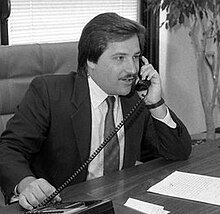Nick Wasicsko
| Nick Wasicsko | |
|---|---|

Wasicsko in 1988
|
|
| 37th Mayor of Yonkers, New York | |
|
In office 1987–1989 |
|
| Preceded by | Angelo R. Martinelli |
| Succeeded by | Henry Spallone |
| Personal details | |
| Born |
Nicholas C. Wasicsko May 13, 1959 Yonkers, New York |
| Died | October 29, 1993 (aged 34) Oakland Cemetery, Yonkers |
| Political party | Democratic |
| Spouse(s) | Nay Noe Wasicsko |
| Profession | Police officer, attorney, politician |
Nicholas "Nick" C. Wasicsko (/wəˈsɪskoʊ/; May 13, 1959 – October 29, 1993) was an American politician from New York and the youngest-ever mayor of Yonkers, New York. As mayor he fought for the desegregation of public housing.
Wasicsko was born May 13, 1959, in Yonkers, to Nicholas and Anne Slota Wasicsko. He was of Polish descent. Wasicsko attended public schools in Yonkers. He graduated from Gorton High School in Yonkers in 1977.
Wasicsko graduated from Manhattan College in 1981 with a degree in government and served for a year as a county police officer. His father died in 1985. In 1986 and 1987 he served as 7th Ward councilman while simultaneously attending New York Law School, from which he was graduated in 1987, the same year he was elected mayor. He was admitted to the bar in New York and Connecticut.
On Nov. 3, 1987, at the age of 28, Wasicsko defeated six-term Republican-Conservative incumbent Angelo R. Martinelli, age 60, to become the youngest-ever mayor of Yonkers, and the youngest mayor in a major American city. Wasicsko won by a margin of 1,466 votes of the 42,700 cast.
The major issue in the 1987 election was the court-ordered integration of public housing in Yonkers. As a candidate, Wasicsko advocated "for resisting the court-ordered integration by legal appeals." Martinelli and Wasicsko "had not taken dramatically opposite positions on the integration dispute, but ... Mayor Martinelli had become identified with much of the emotion surrounding the issue," contributing to his loss.
As mayor, Wasicsko changed his position when the city's lawyers told him that the case was hopeless. He did so not because he thought it was right, but because he had no choice but to comply. After his death, his executive aide at the time said that "He wasn't pro-desegregation, he was pro-compliance."
...
Wikipedia
